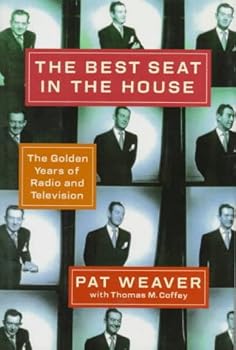The Best Seat in the House: The Golden Years of Radio and Television
Select Format
Select Condition 
Book Overview
Today Show"" and the ""Tonight Show"" discusses his years as president of NBC, his stormy relationship with the head of RCA, and his friendships with television greats. 17,500 first printing. This description may be from another edition of this product.
Format:Hardcover
Language:English
ISBN:0679408355
ISBN13:9780679408352
Release Date:December 1993
Publisher:Knopf Publishing Group
Length:275 Pages
Weight:1.15 lbs.
Dimensions:1.2" x 6.2" x 8.7"
Customer Reviews
3 ratings
You may not know him, but you know his work
Published by Thriftbooks.com User , 14 years ago
To call Pat Weaver prescient is to understate the forward-thinking nature of this visionary. On his first day at NBC, he stopped the cancellation of a little program called "Meet the Press." As a result, this program is the longest running television program to date. Need I mention Pat's creation of "The Tonight Show," "The Today Show" (two other programs that have hung in there quite nicely) as well as my favorite, "Monitor" on NBC Radio? (But there is very, very little about Monitor in this book). Anyone who has an interest in NBC, 20th century advertising, early radio or early television will enjoy this book. There is relatively little about his family, but they are mentioned. (I would have liked to read more about Pat's brother, Doodles.) This is a great description of the rise of American advertising in the 20th century, the movement of an audience from radio to television and the challenges of overcoming the status quo. Well organized and well-written and printed in an easy to ready typeface.
Brief But Very Interesting Tale of the Early Days of Mass Media
Published by Thriftbooks.com User , 16 years ago
The only problem with this book was that it was too short. It was written when Pat Weaver was a very old man, and that sort of comes across in the telling, which is good in some ways (being old enough to remember things that happened way back) and not so good in others (the stories are sort of brief and sometimes fragmentary). However it is a irreplaceable memoir of some of the most interesting (to me) developments of the last century. One surprise in the book was that so much of it dealt with one of my all-time heroes, Fred Allen of radio fame. Weaver was the liaison man between his advertising firm, Young & Rubicam, and Allen. The history of advertising, the ad industry and the large agencies, are a pet interest of mine. Mass advertising, I believe, is (and has been for 80+ years) the single greatest influence on American culture. Before he went on to be a network executive, Weaver was in the center of the move of the ad industry to radio in a truly big way. There had always been commercial advertising in radio, of course, but up till the early 30s, it was mostly localized and scattershot. In the early 30s, the big advertisers (like Proctor & Gamble) and big agencies (like Y & R) were taking the big plunge for the first time, and Weaver has much to say about this. Allen was notorious for his bad relations with sponsors and network management, which he saw as brainless, no-talent interferers. Weaver, it seemed, was the only ad guy he could tolerate, and it was this relationshiop which allowed Allen to create what was, to me, to greatest body of work in old time radio. Weaver left Y & R early on in Allen's career, and most of Allen's later career was marred by scraps with the suit & tie boys, but by that time he was established firmly enough to survive them. Another unexpected bonus to this book was Weaver's long chapter dealing with George Washington Hill, the head of American Tobacco and one of the most interesting and important characters in mid-20th century America. Weaver's portrait of Hill was generous and admiring, which would be considered very un-PC today, since Hill, probably more than any other man, was responsible for America's cigarette habit when it was at its height in the 30s, 40s and into the 50s. There is also an interesting, and very unflattering, word cameo of Albert Lasker, the father of modern advertising who held a low, low place in Weaver's esteem. General Sarnoff, NBC president, comes off pretty poorly as well, though his son Robert is treated sympathtically. It seemed to be a case similar to that of Henry & Edsel Ford, where the father, a truly giant & important American figure, but a narrow-minded jerk in personality and action, dominated a benign and well-meaning son. It is also of great interest to read Weaver's story as that of a man who was so completely a "winner in life's lottery". He was born into a rich and socially prominent family, went to the best schools and univerities, amongst family frie
MAKES ME WISH FOR 'THE GOOD OLD DAYS'
Published by Thriftbooks.com User , 22 years ago
Pat Weaver is not as famous as he should be. He's the man who created the 'magazine concept' type of television advertising that we know today. Had he not done this television would have taken a completely different path. Weaver gives us the gossip about David Sarnoff and many others who were resposible for the birth of broadcast media in America. The book is too simply written at times, almost childlike, but really, that's okay because it's a nice 'mind-candy' way to get a great lesson in media history.




